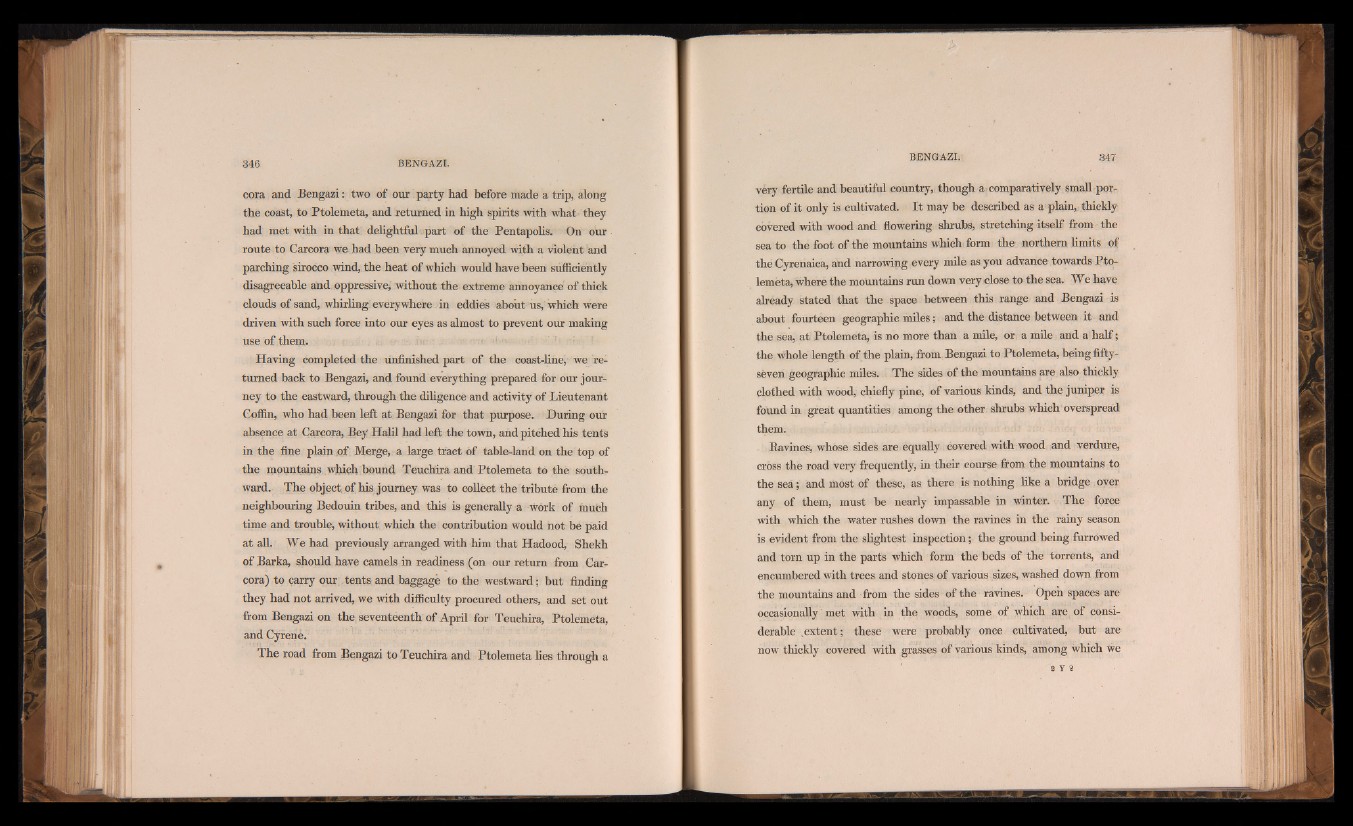
cora and Bengazi: two of our party had before made a trip, along
the coast, to Ptolemeta, and returned in high spirits with what they
had met with in that delightful part of the Pentapolis. On our
route to Carcora we had been very much annoyed with a violent and
parching sirocco wind, the heat of which would have been sufficiently
disagreeable and oppressive, without the extreme annoyance of thick
clouds of sand, whirling everywhere in eddies about us, which were
driven with such force into our eyes as almost to prevent our making
use of them.
Having completed the unfinished part of the coast-line, we returned
back to Bengazi, and found everything prepared for our journey
to the eastward, through the diligence and activity of Lieutenant
Coffin, who had been left at Bengazi for that purpose. During our
absence at Carcora, Bey Halil had left the town, and pitched his tents
in the fine plain of Merge, a large tract of table-land on the top of
the mountains which bound Teuchira and Ptolemeta to the southward.
The object, of his journey was to collect the tribute from the
neighbouring Bedouin tribes, and this is generally a work of much
time and trouble, without which the contribution would hot be paid
at all. We had previously arranged with him that Hadood, Shekh
of Barka, should have camels in readiness (on our return from Carcora)
to carry our .tents and baggage to the westward; but finding
they had not arrived, we with difficulty procured others, and set out
from Bengazi on the seventeenth of April for Teuchira, Ptolemeta,
and Cyrene.
The road from Bengazi to Teuchira and Ptolemeta lies through a
very fertile and beautiful country,, though a, comparatively small portion
of it only is cultivated. • I t may be described as a plain, thickly
covered with wood and flowering shrubs, stretching itself from the
sea to the foot of the mountains which form the northern limits of
the Cyrenaica, and narrowing every mile as you advance towards Pto-
lemèta, where the mountains run down very close to the sea. We have
already stated that the space between this range and Bengazi is
about fourteen geographic miles ; and the distance between it and
thè sea, at Ptolemeta, is no more than a mile, or a mile and a half ;
the whole length of the plain, from Bengazi to Ptolemeta, being fifty-
sèven geographic miles. The sides of the mountains are also thickly
clothed with wood, chiefly pine, of various kinds, and the juniper is
found in great quantities among the other shrubs which overspread
them.
Ravines, whose sides are equally. covered with wood and verdure,
cross the road very frequently, in their course from the mountains to
the sea; and most of these, as there is nothing like a bridge over
any of them, must be nearly impassable in winter. The force
with which the water rushes down the ravines in the rainy season
is evident from the slightest inspection; the ground being furrowed
and torn up in the parts which form the beds of the torrents, and
encumbered with trees and stones of various sizes, washed down from
the mountains and from the sides of the ravines. Open spaces are
occasionally met with in the woods, some , of which are of considerable
.extent ; these were probably once cultivated, but are
now thickly covered with grasses of various kinds, among which We